|
|
|
Sort Order |
|
|
|
Items / Page
|
|
|
|
|
|
|
| Srl | Item |
| 1 |
ID:
098799
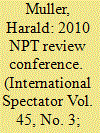

|
|
|
|
|
| Publication |
2010.
|
| Summary/Abstract |
The eighth Review Conference of the Nuclear Non-Proliferation Treaty ended on 28 May with a consensus final document. A further deepening of the non-proliferation regime's crisis was thus avoided. The more cooperative policy of the Obama administration was one of the main reasons for this partial success which was assisted by the pragmatic negotiation posture of some moderate non-aligned states. However, the result is a compromise at the level of the lowest common denominator: the parties did not agree on bold steps towards nuclear disarmament, nor did they strengthen the toolbox for non-proliferation. In the end, the most outstanding result was the plan for a conference on ways and means to foster a Middle East nuclear weapon-free zone.
|
|
|
|
|
|
|
|
|
|
|
|
|
|
|
|
| 2 |
ID:
054436
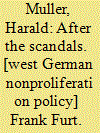

|
|
|
|
|
| Publication |
Frank Furt, PRIF, 1990.
|
| Description |
47p.
|
| Series |
PRIF Report; no.9
|
| Standard Number |
3926197641
|
|
|
|
|
|
|
|
|
|
|
|
Copies: C:1/I:0,R:0,Q:0
Circulation
| Accession# | Call# | Current Location | Status | Policy | Location |
| 041431 | 355.825119/MUL 041431 | Main | On Shelf | General | |
|
|
|
|
| 3 |
ID:
054357


|
|
|
| 4 |
ID:
094493
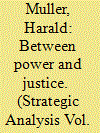

|
|
|
|
|
| Publication |
2010.
|
| Summary/Abstract |
The nuclear non-proliferation regime, despite being frequently criticised for an alleged lack of effectiveness, is in fact an amazing success story. The number of states which had conducted nuclear weapons activities in various stages but which have terminated them at one point surpasses the number of Nuclear-Weapon States (NWSs) by far. At the apex of its success, however, the regime is threatened by erosion from three different directions. A small number of rule-breakers and outsiders undermine its central objective: to stop the spread of nuclear weapons. The refusal of the official NWSs to fulfil their undertaking of nuclear disarmament violates the principle of justice enshrined in the treaty and thereby destroys its legitimacy, as does the perceived readiness by nuclear suppliers to impede the development of nuclear technology in developing countries. The Gordian Knot can presumably only be cut by a u-turn towards a world without nuclear weapons. This insight has meanwhile reached the mainstream security establishment of the United States, the president included. Whether this road will really be taken will determine the future of the regime-with far-reaching consequences for global security.
|
|
|
|
|
|
|
|
|
|
|
|
|
|
|
|
| 5 |
ID:
085126
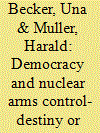

|
|
|
|
|
| Publication |
2008.
|
| Summary/Abstract |
Is there a particularly democratic way of dealing with nuclear arms control? Against the background of democratic peace (DP) theory, and using Immanuel Kant's writing as a starting point, this article argues that democracies should indeed develop a preference for arms control, but that Liberalism as well as the nature of nuclear weapons opens the possibility for contingent developments within a DP framework. While DP theory can thus account for the existence of variance, we maintain that a social constructivist complement based on role, identity, and enemy perception can best explain why a given democracy follows a specific path. Case studies of six Western democracies reveal a considerable variance in their nuclear arms control policies, which can indeed be traced back to the countries' respective roles, identities, and images of the Kantian "unjust enemy."
|
|
|
|
|
|
|
|
|
|
|
|
|
|
|
|
| 6 |
ID:
083545
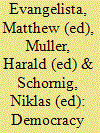

|
|
|
|
|
| Publication |
London, Routledge, 2008.
|
| Description |
xvi, 218p.
|
| Series |
Contemporary security studies
|
| Standard Number |
9780415433891
|
|
|
|
|
|
|
|
|
|
|
|
Copies: C:1/I:0,R:0,Q:0
Circulation
| Accession# | Call# | Current Location | Status | Policy | Location |
| 053954 | 321.8/EVA 053954 | Main | On Shelf | General | |
|
|
|
|
| 7 |
ID:
112649
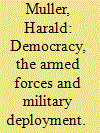

|
|
|
|
|
| Publication |
Frankfurt, Peace Research Institute Frankfurt (PRIF), 2011.
|
| Description |
ii, 28p.Pbk
|
| Series |
PRIF reports no.108
|
| Standard Number |
9783942532310
|
|
|
|
|
|
|
|
|
|
|
|
Copies: C:1/I:0,R:0,Q:0
Circulation
| Accession# | Call# | Current Location | Status | Policy | Location |
| 056421 | 355.4/MUL 056421 | Main | On Shelf | General | |
|
|
|
|
| 8 |
ID:
029123
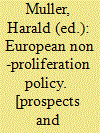

|
|
|
|
|
| Publication |
Oxford, Clareudon Press, 1987.
|
| Description |
xii, 416p.
|
| Standard Number |
0198297025
|
|
|
|
|
|
|
|
|
|
|
|
Copies: C:1/I:0,R:0,Q:0
Circulation
| Accession# | Call# | Current Location | Status | Policy | Location |
| 030113 | 327.174094/MUL 030113 | Main | On Shelf | General | |
|
|
|
|
| 9 |
ID:
052743
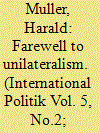

|
|
|
| 10 |
ID:
102387
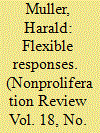

|
|
|
|
|
| Publication |
2011.
|
| Summary/Abstract |
The 2010 US Nuclear Posture Review (NPR) received more attention in European NATO member states than did its predecessor, the 2001 NPR, thanks in large part to President Barack Obama's 2009 Prague speech and to the context of work on NATO's new strategic concept. The pivotal issue for most NATO states was how to handle the US sub-strategic nuclear weapons that remain in Europe. NATO member states perceived the issue differently, depending on the security interests and preferences of the country; each state read into the NPR what matched its preferences best, from an encouragement to pursue nuclear disarmament to a rather conservative preservation of the existing deterrence system. The reactions of five NATO states-France, Estonia, Poland, Germany, and Norway-illustrate this. There is widespread consent that the US sub-strategic nuclear weapons in Europe are militarily obsolete, but some countries ascribe to them a certain political-symbolic function, be it as the "glue of the alliance" or as disarmament showstoppers. Ultimately, the NPR did not end the existing cleavages on the issue of US nuclear weapons based in Europe, but rather postponed resolving them. The current way out for NATO is to move the issue to negotiations with Russia-if Russia is game.
|
|
|
|
|
|
|
|
|
|
|
|
|
|
|
|
| 11 |
ID:
048472
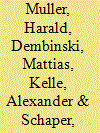

|
|
|
|
|
| Publication |
Frankfurt, Peace Research Institute frankfurt, 1994.
|
| Description |
76p.
|
| Series |
PRIF reports; no. 32
|
| Standard Number |
3928965336
|
|
|
|
|
|
|
|
|
|
|
|
Copies: C:2/I:0,R:0,Q:0
Circulation
| Accession# | Call# | Current Location | Status | Policy | Location |
| 039563 | 382.64/MUL 039563 | Main | On Shelf | General | |
| 041453 | 382.64/MUL 041453 | Main | On Shelf | General | |
|
|
|
|
| 12 |
ID:
083404
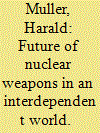

|
|
|
|
|
| Publication |
2008.
|
| Summary/Abstract |
Taking complete nuclear disarmament as a serious and achievable objective at a fixed date in the distant future and devising a sequence of carefully drafted interim steps toward that end would contribute to a cooperative world order.
|
|
|
|
|
|
|
|
|
|
|
|
|
|
|
|
| 13 |
ID:
054439
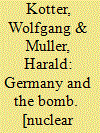

|
|
|
|
|
| Publication |
Frank Furt, PRIF, 1990.
|
| Description |
40p.
|
| Series |
PRIF Report; no.14
|
| Standard Number |
3926197781
|
|
|
|
|
|
|
|
|
|
|
|
Copies: C:1/I:0,R:0,Q:0
Circulation
| Accession# | Call# | Current Location | Status | Policy | Location |
| 041438 | 355.825119/KOT 041438 | Main | On Shelf | General | |
|
|
|
|
| 14 |
ID:
061650
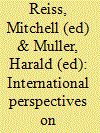

|
|
|
|
|
| Publication |
Washington, DC, Division of International Studies, Woodrow Wilson International Center for Scholars, 1995.
|
| Description |
159p.
|
| Series |
Woodrow Wilson Internation Center working paper series; no.99
|
|
|
|
|
|
|
|
|
|
|
|
Copies: C:1/I:0,R:0,Q:0
Circulation
| Accession# | Call# | Current Location | Status | Policy | Location |
| 038338 | 355.825119/REI 038338 | Main | On Shelf | General | |
|
|
|
|
| 15 |
ID:
135243
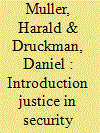

|
|
|
|
|
| Summary/Abstract |
This article provides an overview of this thematic issue. We discuss four issues about the role of justice claims in international relations (ir) scholarship: the discrepancy between the historical centrality of justice themes in political thought and empirical research in ir; challenges to the assumption of utility-maximizing motives; justice in the context of rules or norms of negotiation, and the rise of empirical research on justice in ir. We conclude with themes suggested by the contributing authors in this issue and suggest priorities for further research on justice in international negotiation.
|
|
|
|
|
|
|
|
|
|
|
|
|
|
|
|
| 16 |
ID:
133601
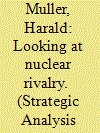

|
|
|
|
|
| Publication |
2014.
|
| Summary/Abstract |
The 100th anniversary of World War I is a reminder of the risks of great power politics. The current dynamics of world politics rest on the relations among the US, China, Russia and India, and their interlocking relations with friends and enemies in a region that extends from the Gulf to the Japanese archipelago. A naval and nuclear arms race is underway that reflects these complex relationships. One of the numerous disputes could spread conflict across the whole region. This risk includes the nuclear factor. A three-pronged effort including political detente, arms control and nuclear disarmament is needed to defuse these dangers, which will otherwise continue to grow.
|
|
|
|
|
|
|
|
|
|
|
|
|
|
|
|
| 17 |
ID:
158673
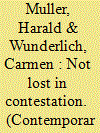

|
|
|
|
|
| Summary/Abstract |
With near universal membership, the nuclear nonproliferation regime can be considered a success of global nuclear governance. While it has proven robust since the Nonproliferation Treaty entered into force in 1970, the regime has faced continuous contestation, precisely because it is a delicate compromise between the nuclear and non-nuclear weapon states. In this article, we analyze the patterns of contestation within the regime as well as the actors driving these contestation processes. Our purpose is to assess how contestation has affected the development of nuclear norms. We show that contestation can lead to normative progress, result in blockage, or even lead to decay. We argue that the outcome depends on three factors: commitment by the powerful parties to appreciate the positions of the non-nuclear weapon states, the engagement of bridge-builders to shape compromises, and the construction of reciprocal gains for and compliance by all parties.
|
|
|
|
|
|
|
|
|
|
|
|
|
|
|
|
| 18 |
ID:
047693
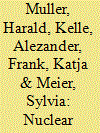

|
|
|
|
|
| Publication |
Frankfurt, Peace Research Institute frankfurt, 1996.
|
| Description |
iii, 49p.
|
| Series |
PRIF Reports; no.46
|
| Standard Number |
3928965824
|
|
|
|
|
|
|
|
|
|
|
|
Copies: C:1/I:0,R:0,Q:0
Circulation
| Accession# | Call# | Current Location | Status | Policy | Location |
| 041466 | 355.825119/MUL 041466 | Main | On Shelf | General | |
|
|
|
|
| 19 |
ID:
004756
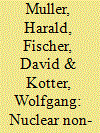

|
|
|
|
|
| Publication |
Oxford, Oxford University Press, 1994.
|
| Description |
xii, 285p.
|
| Standard Number |
0198291558
|
|
|
|
|
|
|
|
|
|
|
|
Copies: C:2/I:0,R:0,Q:0
Circulation
| Accession# | Call# | Current Location | Status | Policy | Location |
| 035724 | 355.825119/MUL 035724 | Main | On Shelf | General | |
| 035825 | 355.825119/MUL 035825 | Main | On Shelf | General | |
|
|
|
|
| 20 |
ID:
102393
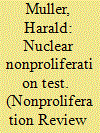

|
|
|
|
|
| Publication |
2011.
|
| Summary/Abstract |
The most important short-term success of President Barack Obama's nuclear weapons policy has been to halt the erosion of the Treaty on the Non-Proliferation of Nuclear Weapons (NPT). Obama's policies helped extract a minimum positive result from the 2010 NPT Review Conference, a favorable outcome compared to the chaos that his predecessor's representatives had created at the 2005 conference. However, the result is only a compromise of the least common denominator between the nuclear weapon states and the Non-Aligned Movement (NAM). The nuclear weapon states refused to agree to any specific actions or deadlines for disarmament, while the NAM states rejected any strengthening of the nonproliferation toolbox. The 2010 conference's final document is thus an exercise in minimalism, with the notable exception of the section addressing the Middle East. As measured by delegates' statements, the Obama policy was welcomed as a positive development. This factor enabled key players, such as Egypt and Brazil, to strive for compromise, and others, such as Russia and China, not to block it. This outcome owes more to the "Prague spirit" and the New START than to the Nuclear Posture Review. By compromising on the Middle East, the Obama administration showed the necessary flexibility to motivate the key NAM actor, Egypt, to deliver the agreement of that bloc, foiling the intentions of Iran to prevent a consensus.
|
|
|
|
|
|
|
|
|
|
|
|
|
|
|
|
|
|
|
|
|